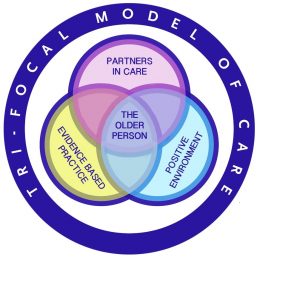An online education program on the care of older people: the Centre for Innovation and Education in Aged Care (CIEAC)



The Centre for Innovation and Education in Aged Care (CIEAC) provides a free online education program suitable for anyone with an interest in evidence-based care promoting the well-being of older people. The Centre was established within the School of Nursing and Midwifery at Deakin University in Burwood, Australia in 2012. The primary aim of the CIEAC is to provide education, training and support to health and aged care staff, enabling an understanding of evidence-based care that improves the well-being of older people in health or aged care settings.
The education program is based on the Tri-focal Model of Care which focuses on three major concepts: a partnership-centered care approach which seeks to engage older people, their family, staff members, and health professionals in collaborative practice, within a positive environment, while implementing evidence-based care. Research has shown that this model of care can enable residents, family members, and staff to be partners-in-care in long-term care settings.
The education program currently comprises of twelve modules and each module contains learning content, reflection activities, opportunities to participate in discussions with other participants, self–assessment quizzes and a final assessment. For each module, a certificate of completion is awarded for a grade of 70% or more. The modules are organized into three categories; professional support (3 modules), clinical – aged care (7 modules), and clinical – acute care (2 modules). The program is promoted in a number of ways. It is accessible from a public blog site through Deakin University; it is a learning resource for nursing students; it is used as a learning platform for hospital and aged care staff, and it is available via links from other programs, via word of mouth, or through a web search.
Website: https://blogs.deakin.edu.au/cieac/
Main target group: Both younger and older people (i.e. intergenerational)
Other target group(s): Staff in aged care facilities and health care organisations
Sector(s): Education, Health, Information and communication, Labor, Long-term care
Other sector(s): Research
Desired outcome for older people:
Learn, grow and make decisions
Other Issues: Evidence-based practice, Positive environments, Partners-in-care approach, Life-long learning, Dignity and respect, Community support, Innovation